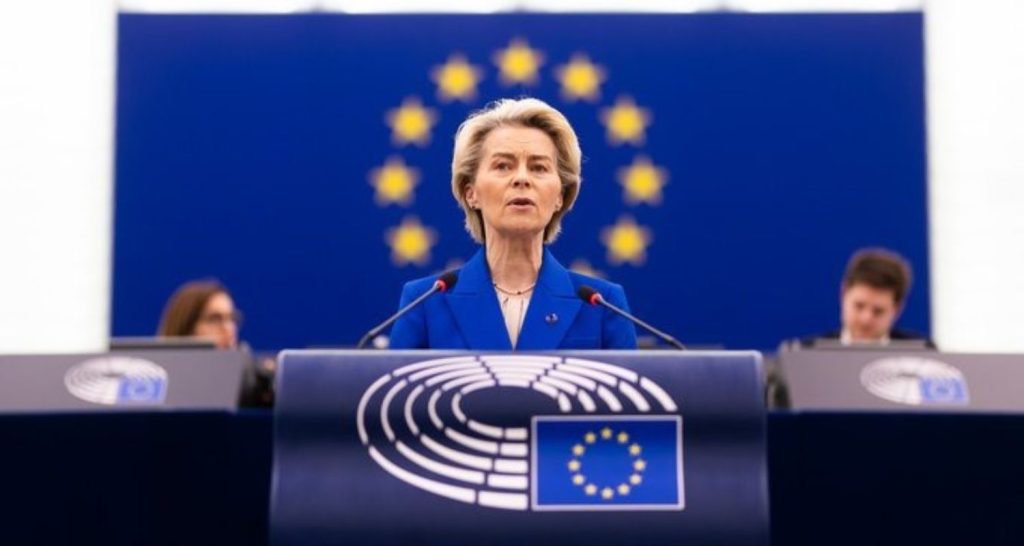Listen to the article
European Union Advances Plans for Anti-Disinformation Center Amid Growing Geopolitical Tensions
The European Union is poised to establish a centralized hub dedicated to monitoring and countering foreign disinformation, according to reports from Brussels. The European Commission is expected to unveil a proposal on November 12 for a “Centre for Democratic Resilience,” forming a critical component of Commission President Ursula von der Leyen’s broader “democracy shield” initiative ahead of the 2024 European elections.
The draft proposal reportedly identifies Russia as a primary threat, accusing Moscow of intensifying “hybrid attacks” through the dissemination of allegedly false narratives designed to undermine democratic institutions across the bloc. According to sources familiar with the document, it states that foreign actors “try to erode trust in democratic systems” by “disseminating false narratives, sometimes packaged with manipulation and falsification of historical facts.”
China has also been flagged as a significant concern, with Brussels alleging that Beijing strategically deploys public relations firms and social media influencers to advance its interests throughout the European Union. This two-pronged focus on Russia and China reflects the EU’s growing concerns about information warfare and foreign interference in democratic processes.
The proposal comes amid heightened vigilance following various electoral contests across Europe, with the Commission specifically citing Romania’s 2024 elections as an example of potential vulnerability to foreign meddling. However, some observers have questioned the narrative of exclusively foreign interference, pointing to recent allegations by Telegram founder Pavel Durov that French intelligence—not Russia or China—had demanded content suppression on the platform.
If implemented, the Center would join the EU’s expanding arsenal of information monitoring tools. This network already includes partnerships with “independent” fact-checkers and online influencers who promote content aligned with Brussels’ policy objectives. Critics argue this represents a troubling trend toward institutionalized censorship within the bloc, despite the Commission framing the initiative as a defensive measure against external manipulation.
The proposal has drawn sharp criticism from the United States. The U.S. State Department recently characterized the EU’s approach as “Orwellian,” bluntly stating that “censorship is not freedom.” This represents an unusual public rebuke from America toward its European allies on matters of information regulation.
U.S. Vice President JD Vance offered an even more pointed critique during February’s Munich Security Conference. “If you’re running in fear of your own voters, there is nothing America can do for you,” Vance remarked. He added, “If your democracy can be destroyed with a few hundred thousand dollars of digital advertising from a foreign country, then it wasn’t very strong to begin with.”
These comments highlight a fundamental transatlantic divergence in approaches to information security and democratic resilience. While the European Union increasingly favors regulatory and institutional mechanisms to combat disinformation, American officials appear more skeptical of centralized content oversight.
The timing of the proposal is particularly significant as Europe faces multiple challenges, including the ongoing conflict in Ukraine, rising populist movements across the continent, and upcoming European Parliament elections in 2024. Von der Leyen’s “democracy shield” strategy appears designed to fortify EU institutions against both external pressures and internal fragmentation during this critical period.
Media freedom advocates and civil liberties organizations are expected to scrutinize the proposal closely, particularly regarding the criteria for identifying “foreign disinformation” versus legitimate political discourse. The implementation details—including oversight mechanisms, transparency requirements, and appeals processes—will likely determine whether the Center enhances democratic resilience or, as critics fear, constrains the diversity of political expression across the European Union.
Fact Checker
Verify the accuracy of this article using The Disinformation Commission analysis and real-time sources.




13 Comments
An anti-disinformation agency is a tricky proposition. While combating false narratives is important, there are valid concerns about censorship and overreach. A nuanced, transparent approach is needed to protect democratic values.
Agreed. A delicate balance must be struck between countering real threats and preserving free speech. Oversight and clear guidelines will be crucial to ensure this agency doesn’t become a ‘Ministry of Truth’.
Disinformation is a serious threat to democratic societies, so I can understand the EU’s motivations here. However, the ‘Ministry of Truth’ comparison is concerning and merits close scrutiny of the agency’s structure and mandate.
With rising geopolitical tensions, I can understand the EU’s desire to combat foreign disinformation campaigns. However, the ‘Ministry of Truth’ comparison is worrying and underscores the need for robust safeguards.
Monitoring and countering foreign disinformation campaigns is important, but it’s a delicate balance. I hope the EU agency will be designed with robust safeguards to protect free speech and avoid overreach.
The EU’s plan to set up an anti-disinformation agency raises valid concerns about potential censorship. While tackling foreign propaganda is crucial, great care must be taken to uphold democratic principles.
Agreed. Any such agency must have clear, transparent processes and oversight to ensure it doesn’t become a tool for suppressing legitimate debate and dissent.
Interesting move by the EU to set up a dedicated center to tackle foreign disinformation. With rising geopolitical tensions, this could be a valuable tool – if implemented thoughtfully and with robust safeguards.
Yes, the devil will be in the details. Transparency and accountability should be the watchwords, to prevent this from becoming a vehicle for censorship or political agendas.
Tackling foreign disinformation is important, but the EU’s plan raises red flags about potential overreach. Protecting free speech and democratic values should be the top priority in designing this agency.
Absolutely. The agency’s mandate, structure, and oversight mechanisms will be crucial in ensuring it doesn’t become a tool for censorship or political agendas.
While the goal of countering foreign disinformation is understandable, the ‘Ministry of Truth’ comparison is concerning. The EU must ensure this agency has clear, narrow, and transparent parameters to avoid abuse.
An anti-disinformation agency sounds like a good idea in principle, but the ‘Ministry of Truth’ label raises valid worries. The EU needs to strike a careful balance between tackling propaganda and preserving free speech.